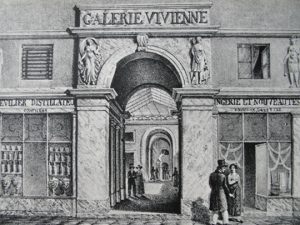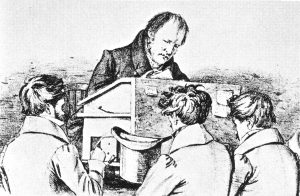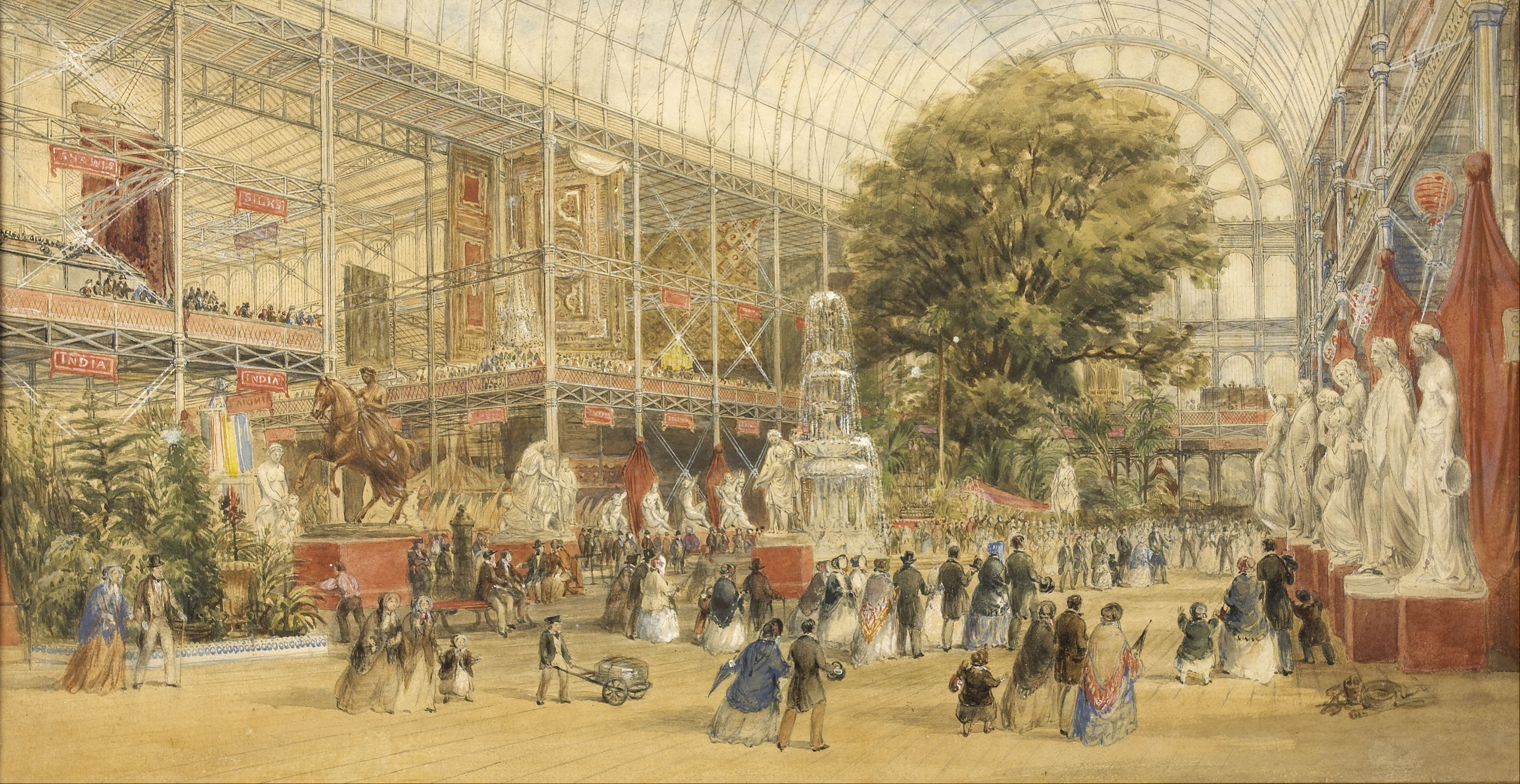“Benjamin’s Concept of History As A Source of Arendt’s Idea of Judgment” by Ronald Beiner is published in two parts during successive weeks. The following is the second portion. The first installment can be found here.
Universal history (the culmination of historicism)15 is based on the flow of thoughts. Materialistic historiography is based on the arrest of thoughts (thesis XVII). With the latter, historical thinking receives a “shock,” and this shock stops it in its tracks. It comes face to face with the revolutionary moment, and is determined to blast the moment out of the homogeneous course of history. This is what Benjamin calls the Jetztzeit (now-time) in which the present and past are drawn into a messianic relation (thesis A).
Through shock, arrest, and blasting, historical materialism replaces the homogeneous, empty time of historicism with the time filled by Jetztzeit (thesis XIV). Where the historicist sees an inert “chain of events,” the historical materialist sees a broken vessel in need of repair, a ruined past in need of salvation, a forsaken ancestor in need of awakening (thesis IX).
What serves, above all, to differentiate materialist historiography from historicism is that the latter is based on the idea of progress (theses VIII-XIII). It was this faith in progress that enabled the Social Democrats to betray the German working class (thesis XI). But historical materialists cannot share this complacent faith in progress.
Their reflection on history never forgets the fate of the vanquished and therefore is governed by the tragic knowledge that the cultural treasures that are the spoils of the victors “have an origin which [one] cannot contemplate without horror”; “there is no document of civilization which is not at the same time a document of barbarism” (thesis VII).
This awareness shatters any complacency on the part of the historian. Social democracy encourages the notion that one is “moving with the current” (thesis XI), whereas the historical materialist “regards it as his task to brush history against the grain” (thesis VII). Historicism finds security in the continuum of history, while historical materialism seeks those charged moments that explode the continuum of history through revolutionary action (theses XIV-XV).
The French Revolution saw a revolution in historical consciousness. It was “a tiger’s leap into the past,” and this was at the same time a “leap in the open air of history.” Benjamin tells us that this is how Marx himself understood the revolution (thesis XIV).16 Benjamin believes that fascism can only be defeated by shattering all complacency, which is fostered by the Social Democrats’ faith in progress.
For this one requires a catastrophic appreciation of history: “The tradition of the oppressed teaches us that the ‘state of emergency’ in which we live is not the exception but the rule” (thesis VIII).17 History is a sky-high pile of debris and the assertion of progress is meant to deflect our gaze from this unredeemed debris (thesis IX). Historical materialism means that the vanquished are not forgotten, and this means that one is never deterred by the idea of progress from continuing to wage “the fight for the oppressed past” (thesis XVII).
According to thesis XII, the working class, if it is to remain the bearer of historical knowledge, must keep its attention trained on “the image of enslaved ancestors rather than that of liberated grandchildren.” The transgression of this precept was the unforgivable sin of the Social Democrats, whose treachery was to depict the working class as the redeemers of future generations. By dangling before the working class the prospect that things would get better, it caused the remembrance of past generations to be overshadowed by the contemplation of generations to come.
But is this not the case with all progressivist social doctrines, including Marxism?18 (It was, after all, not only the Social Democrats who betrayed their own cause, as Benjamin makes clear enough in thesis X; it is reflection on the deeper and more blatant treachery of the Communists in 1939-1940 that nearly tempts one to imitate the retreat from worldly entanglements of the monastic orders.)19
 In its anxiety to liberate the grandchildren, the progressivist ideology risks alienating us from the sufferings of our downtrodden ancestors, who cannot be liberated, but at best, simply remembered. The historiographical task is not to anticipate better times to come but to hold open the promise of redemption for all moments that have already been.
In its anxiety to liberate the grandchildren, the progressivist ideology risks alienating us from the sufferings of our downtrodden ancestors, who cannot be liberated, but at best, simply remembered. The historiographical task is not to anticipate better times to come but to hold open the promise of redemption for all moments that have already been.
Above all, the renunciation of historicism in favor of historiography means that remembrance shall prevail over soothsaying: “We know that the Jews were prohibited from investigating the future. The Torah and the prayers instruct them in remembrance, however” (thesis B). Given that the “Theses” are animated by antihistoricist pessimism, if not antihistorical despair, the continued adherence to Marx’s authority (invoked in theses IV, XI, XII, and XIV) remains something of a puzzle.
Christian Lenhardt correctly notes that in the “Theses” Benjamin asserts with carefree assurance the claim that Marx, together with Blanqui and in stark opposition to social democracy, shares his understanding of the meaning of revolution, without any effort on Benjamin’s part to furnish textual substantiation of the claim.20 However, there is at least one passage (from the Nachlass) in which Benjamin appears to concede that his critique of the idea of progress places a measure of critical distance between his conception of historical materialism and that of Marx. He begins by quoting Marx to the effect that revolutions are the locomotive of world history. But then he suggests that maybe it is entirely otherwise, that maybe revolutions exhibit the human race reaching for the emergency brake.21
This recalls thesis XVI: “A historical materialist cannot do without the notion of a present which is not a transition, but in which time stands still and has come to a stop.” (And in thesis XV, time is arrested by revolutionary action; thesis XVII speaks of a messianic cessation of happening.) According to Marx’s metaphor, the historical process is a train journey powered by revolution, whereas it is this very train journey that must be brought to a sudden halt in order to realize Benjamin’s vision of historical materialism.
The Benjaminian historiographer wishes to get off this train because, far from being elated by the destination it promises, he or she continues to be troubled by the whistle-stops that have been left behind.Despite the fragmentary and tentative character of the “Theses,” it would be hard to overstate the importance of the text, not only for the understanding of Benjamin’s own work but also, as we have suggested above, for the disclosure of a unique and unprecedented concept of historiography that is of more general significance (and that was tacitly picked up and pursued in Arendt’s writings on the meaning of the human power of judging).22
On the other hand, it is not easy to locate the precise status of the “Theses.” It appears that Benjamin was averse to the idea of their publication, for, he said, “it would leave the door wide open to enthusiastic misunderstanding.”23 Benjamin claimed that he kept the ideas of the “theses” to himself for 20 years, but it is not quite true that he strictly kept them to himself: Some of the key formulations of the “Theses” were already stated in his essay on “Edward Fuchs, Collector and Historian” (1937), and the redemptive conception of history goes all the way back to the “Theologico-Political Fragment” (1920-1921).24
As for the question of the further elaboration of the “Theses,” there are indications that Benjamin intended to develop the “Theses” in the direction of a more general critique of the idea of progress.25
It is clear that Benjamin himself was convinced of the vital methodological role of the “Theses.” He describes the work as a “theoretical armature” for one of the Baudelaire essays that he had done for the Institute for Social Research (whereas, according to thesis XVII, universal history – the mode of historiography practiced by historicism – is incapable of being furnished with a theoretical armature.
The “method” that the “Theses” adumbrate is as follows: “to blast a specific era out of the homogeneous course of history – blasting a specific life out of the era or a specific work out of the lifework” (thesis XVII).26 The result of this method is the Aufhebung in this work of the lifework; in the lifework, the era; and in the era, the entire course of history. “A historical materialist approaches a historical subject only where he encounters it as a monad.”27
 In letters to Scholem and Adorno, Benjamin spoke of the need for an epistemological underpinning for his most ambitious project, the major work on the Paris Arcades, and several commentators view the “Theses” as supplying the required epistemology. In the words of Susan Buck-Morss, “it was intended as a methodological introduction to the ‘Arcades’ project,” and as such, “it instructs the reading of his own work.”28 And Adorno goes so far as to claim that the “Theses” constitutes one of the few completed portions of the sprawling and unconsummated Arcades project.29 Assuming that these conjectures are correct, the “Theses” should ultimately read in the context of The Arcades Project.30
In letters to Scholem and Adorno, Benjamin spoke of the need for an epistemological underpinning for his most ambitious project, the major work on the Paris Arcades, and several commentators view the “Theses” as supplying the required epistemology. In the words of Susan Buck-Morss, “it was intended as a methodological introduction to the ‘Arcades’ project,” and as such, “it instructs the reading of his own work.”28 And Adorno goes so far as to claim that the “Theses” constitutes one of the few completed portions of the sprawling and unconsummated Arcades project.29 Assuming that these conjectures are correct, the “Theses” should ultimately read in the context of The Arcades Project.30
Here Benjamin is himself writing as a cultural historian. He must therefore address the questions: What is cultural history? What political justifications can it have? How can the activity of the historian be reconciled with any kind of revolutionary political commitment? How can preoccupation with a past that cannot be changed contribute anything to the task of changing the world? Above all, Benjamin must clarify to himself why a historical materialist should concern himself or herself at all with writing the cultural history of nineteenth-century bourgeois Paris.
Perhaps the “Theses” do not shed very much light on what it means, in general, to be a historical materialist, but they do at least clarify what it meant for Benjamin to be a historical materialist. To the question “Why does a revolutionary write history?” Benjamin is able, on the basis of the “Theses,” to answer: “To save the dead from oblivion.” In The Arcades Project we read: “At any given time, the living see themselves in the midday of history. They are obliged to prepare a banquet for the past. The historian is the herald who invites the dead to the table.”31
The ever present danger, as Benjamin says in thesis V, is that the image of the past “is never seen again.” This image “flits by,” and therefore must be seized before it is gone. When Benjamin says that “every image of the past that is not recognized by the present as one of its own concerns threatens to disappear irretrievably,” the emphasis is not on “the present’s own concerns” but on the need to save the past from the threat of irretrievable disappearance. This overriding concern of the “Theses” is expressed most decisively in thesis III: The chronicler of the past should observe the truth that “nothing that has ever happened should be regarded as lost for history.”
***
What Hannah Arendt fundamentally intended with her project on Judging – insofar as we can extrapolate this intention from the Lectures on Kant’s Political Philosophy – was a vindication of the perennial storytelling capacity of human beings. Her sources were Cicero (with his idea of a “silent sense”),32 Gracian (with his idea of taste),33 Machiavelli (with his notion that the “History of Florence” is really the storybook of Florentine Stories),34 Kant (with his idea of exemplarity as the “go-cart” of judgment)35 – and (not least) Walter Benjamin. Benjamin’s “Theses” were a tacit and uncited source of the Arendtian conception of historical judgment, and quite possibly the essential inspiration of this Arendtian conception.
As Arendt framed the crucial philosophical issue in LKPP, the conception of judgment that she sought to champion found its opposing interlocutors in Hegel, Marx, and Kojève.36 A key implicit drama in the philosophical dialogue unfolded in the LKPP is Arendt’s unspoken suggestion that Benjamin belongs on her side of the argument rather than the Hegel-Marx side. As was the case with other famous philosophical friendships that involved Benjamin, it was important to Arendt to lay claim to Benjamin, and to try to disassociate Benjamin from unwelcome intellectual engagements. LKPP was (among other things) Arendt’s way of asserting her claim upon Benjamin.
Tracing themes in Hannah Arendt’s Kant Lectures back to Benjamin’s “Theses” is a fairly easy endeavour.37 Arendt, no less than Benjamin, was committed to an antihistoricist historiography. Although her reflections were presented as a general account of judging as a mental faculty, what she really offers is a theory of historical judgment. Arendt was concerned with the judgment of the political spectator reflecting on “what has been” – a capacity of reflective judgment exemplified preeminently in the activity of the historian.
Just as Benjamin speaks of blasting the revolutionary (or messianic) moment out of the homogeneous course of history, so Arendt is determined to focus on the particular qua particular – that is, those “stories” or particular episodes of historical experience whose exemplary meaning cannot be captured by or reduced to some universal narrative of History with a capital H. An adequate theory of historical judgment, Arendt implies, depends upon defeating the assumptions, which she associates with Hegel and Marx, that there is such a thing as a progress of the human race and that all things should be measured by the criterion of success.
Against such historicist assumptions, she appeals to the autonomy of the judging spectator.

Autonomous judgment is identified with what she calls the “backward glance” of the historian (as opposed to Hegel’s Weltgeschichte as Weltgericht – judgment pronounced by the courseof world history). Historiography redeems those who are left behind by the historical process. This Benjaminian conception is expressed perfectly in the epigram Arendt quotes from Lucan’s Civil War (also known as Pharsalia): “The victorious cause pleased the gods, but the defeated one pleases Cato.”38
Recall again thesis XII’s suggestion about the importance of keeping attention focused on “the image of enslaved ancestors rather than that of liberated grandchildren.” The core idea here was anticipated, curiously enough, by Kant. Kant was himself a notable champion of the idea of historical progress; yet Kant nonetheless appreciated that even if the postulate of progress on the part of the human species turned out to be valid, this would not count as a universal redemption of every human individual. He wrote: “It remains strange that the earlier generations appear to carry through their toilsome labor only for the sake of the later, to prepare for them a foundation on which the later generations could erect the higher edifice which was Nature’s goal, and yet that only the latest of the generations should have the good fortune to inhabit a building on which a long line of their ancestors had (unintentionally) labored without being permitted to partake of the fortune they had prepared.”39
That is, even if it were true that history has a telos and that the progress of the species is capable of actualization, the suffering and defeat along the way of those contributing to this telos would be left unredeemed. Even if history were to offer an ultimate redemption, it would be redemptive only for the final generation, not for their forebears. How, then, can we conceive of universal redemption?
This was a problem that Benjamin and Arendt both wrestled with. For Benjamin, clearly, it seemed to require some manner of resort to the messianic. Arendt, I would suggest, devised a more modest way of addressing the same problem: As human beings we have a capacity within us to apprehend the human dignity instantiated in losing causes, and by exercising this power of historical judgment (that is, redeeming them by our faculty of judging), we ensure that the dead are never truly buried.40
Ronald Beiner is a Professor of Political Science at the University of Toronto and a Fellow of the Royal Society of Canada. In 1982 he published an edition of Hannah Arendt’s Lectures on Kant’s Political Philosophy (foreign-language editions have appeared or are forthcoming in 15 other languages). He is the author of numerous books, the most recent of which are Political Philosophy: What It Is And Why It Matters (Cambridge University Press, 2014), Civil Religion (Cambridge University Press, 2011), and Liberalism, Nationalism, Citizenship (UBC Press, 2003).
_______________________________________________________________________
15 This repudiation of universal history is succinctly expressed by Adorno: “No universal history leads from savagery to humanitarianism, but there is one leading from the slingshot to the megaton bomb.” Negative Dialectics (New York: Seabury Press, 1973), 320; quoted in Wolin, Walter Benjamin, p. 270.
16 Needless to say, Marx’s criticisms of past revolutions insofar as they felt obliged to draw their poetry from the past, cited earlier, make it highly unlikely that Marx understood the French Revolution in the way that Benjamin does.
17 One can detect an echo of Carl Schmitt in Benjamin’s reference to the “state of emergency.” Benjamin’s debt to Schmitt is discussed by Lilla: see The Reckless Mind, pp. 93-95.
18 For a critique of mainstream Marxism from the point of view of thesis XII, see Christian Lenhardt, “Anamnestic Solidarity: The Proletariat and its Manes,” Telos, No. 25 (Fall, 1975): 133-154. Lenhardt’s citations from Horkheimer are also relevant in this context.
19 Cf. Gesammelte Schriften, I, 3, p. 1228, on Brecht’s misunderstanding of the import of thesis X; and Tiedemann, “Historical Materialism or Political Messianism?” pp. 71, 90, and p. 103 n. 60, where Tiedemann argues convincingly that the main, if unspoken, target of thesis X is not the Social Democrats, as the subsequent theses would lead one to believe, but rather the Communists.
20 Lenhardt, “Anamnestic Solidarity,” p. 137, p. 137 n. 7, and pp. 146-148 (which includes discussion of the passages from the Eighteenth Brumaire cited earlier). Tiedemann says that “Benjamin is inconclusive regarding the relationship of his concept of history to that of Marx,” but Tiedemann leaves little doubt about how he believes the equivocation is resolved. Whereas Blanqui is – rather implausibly – paired with Marx in thesis XII, it is clear that in the formulation of Benjamin’s concept of revolution, Blanqui wins out over Marx. Despite what Benjamin says in thesis XIV, for Marx revolution is not a “leap in the open air of history.” See Tiedemann, “Historical Materialism or Political Messianism?” pp. 93, 95-96, and p. 103 n. 67.
21 Gesammelte Schriften, I, 3, p. 1232. Cf. Wohlfarth, “On the Messianic Structure of Walter Benjamin’s Last Reflections,” p. 168; and Tiedemann, “Historical Materialism or Political Messianism?” p. 95.
22 For a similar judgment of the significance of the “Theses,” see Richard Wolin, Walter Benjamin, Chapter 8.
23 Gesammelte Schriften, I, 3, pp. 1227. Cf. Bahti, “History as Rhetorical Enactment,” p. 3; Wolin, Walter Benjamin, p. 260; and Tiedemann, “Historical Materialism or Political Messianism?” p. 71.
24 Walter Benjamin, One-Way Street and Other Writings, trans. Edmund Jephcott and Kingsley Shorter (London: New Left Books, 1979), pp. 349-386 and 155-156 respectively; cf. “Publisher’s Note,” pp. 31 and 41-42.
25 See Wolin, Walter Benjamin, p. 259. In Gesammelte Schriften, I, 3, pp. 1238-1239,
Benjamin produces a list of a (presumably) intended series of critiques, the last of which reads: “critique of Marx’s theory of progress.” Cf. Tiedemann, “Historical Materialism or Political Messianism?” p. 103 n. 67.
26 In a letter to the Adornos, Benjamin drew special attention to thesis XVII, which he
characterized as central to a proper methodological understanding of his work. Gesammelte Schriften, I, 3, pp. 1223 and 1226. Cf. Tiedemann, “Historical Materialism or Political Messianism?” p. 80.
27 For discussion of Benjaminian historiography as a kind of “monadology,” see DavidFrisby, “Walter Benjamin’s Prehistory of Modernity as Anticipation of Postmodernity? Some Methodological Reflections,” in ‘With the Sharpened Axe of Reason’: Approaches to Walter Benjamin, ed. Gerhard Fischer (Oxford: Berg, 1996), pp. 16, 20, and 21.
28 Susan Buck-Morss, “Walter Benjamin – Revolutionary Write (I),” New Left Review,
No. 128 (July-August, 1981), pp. 52-53. Cf. Tiedemann, “Historical Materialism or Political Messianism?” p. 97.
29 Theodor Adorno, “A Portrait of Walter Benjamin,” in Prisms, trans. Samuel and Shierry Weber (Cambridge, MA: MIT Press, 1982), p. 239.
30 Walter Benjamin, The Arcades Project, trans. Howard Eiland and Kevin McLaughlin (Cambridge, MA: Belknap Press, 1999). For a section of The Arcades Project that is directly relevant to the “Theses,” see pp. 456-488: “Convolutes,” N [Theoretics of Knowledge; Theory of Progress]. Frisby, in “Walter Benjamin’s Prehistory of Modernity,” even though he never refers specifically to the “Theses,” gives a good account of how the “Theses” can be regarded as a methodological introduction to or theoretical armature for The Arcades Project.
31 The Arcades Project, p. 481.
32 Hannah Arendt, Lectures on Kant’s Political Philosophy, ed. Ronald Beiner (Chicago: University of Chicago Press, 1989) [hereafter, LKPP], pp. 63-64 and 65-66.
33 LKPP, pp. 64 and 66.
34 LKPP, p. 56.
35 LKPP, pp. 76-77 and 79-85.
36 It’s not an accident that Arendt, in LKPP, p. 162, n. 129, cites Kojève. According to Young-Bruehl (For Love of the World, pp. 116-117), Arendt attended some of Kojève’s famous Hegel seminars. For a good general sketch of Kojève’s thought, see Lilla, The Reckless Mind, Chapter 4. Lilla’s encapsulation of Kojève – “The fate of losers held no interest for him” (p. 136) – points to that aspect of Benjamin’s “Theses” that was most relevant for Arendt.
37 Cf. my remarks in LKPP, pp. 155-156.
38 LKPP, p. 5. The same epigram was the first of two epigraphs that Arendt typed onto the intended title page of Judging (the only page of this unwritten work that she lived to type!). For the source, see Lucan, Civil War, trans. Susan H. Braund (Oxford: Oxford University Press, 1992), p. 6 (I: 128). Arendt, in the “Postscriptum to Thinking,” refers to “old Cato,” i.e., Cato the Elder (234-149 B.C.), but Lucan’s Cato is in fact Cato the Younger (95-46 B.C.). For some commentary on Arendt’s two epigraphs, see my discussion in LKPP, pp. 126-127.
39 Immanuel Kant, On History, ed. Lewis White Beck (Indianapolis: Bobbs-Merrill, 1963), p. 14; quoted by Arendt in Between Past and Future: Eight Exercises in Political Thought (New York: Penguin, 1977), p. 83. In the next sentence Kant writes that “however puzzling this may be,” the conundrum is unavoidable “if one assumes that a species of animals should have reason, and, as a class of rational beings each of whom dies while the species is immortal, should develop their capacities to perfection.”
40 In my commentary on Arendt in LKPP (p. 127), I quoted Ari Willner, a voice of the Warsaw Ghetto resistance: “Not one of us will leave here alive. We are fighting not to save our lives but for human dignity.” The idea of redemption by means of historical judgment presumes that there will prevail a non-Nazi world capable of retrospectively judging this tragedy as the defeat of righteousness by evil. In that sense, of course, we continue to require the idea of the progressive unfolding of a better world to come. Still, this notion confers an autonomous dignity on the historically defeated that is lacking in the versions of historicism repudiated by Benjamin and Arendt. In this essay, I have drawn freely on material I published previously in “Walter Benjamin’s Philosophy of History,” Political Theory, Vol. 12, no. 3 (August, 1984): 423-434.




